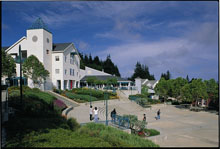College Eight is at the forefront of a campuswide effort to revitalize the college core courses, and Provost Ravi Rajan has his eye on creating an "outstanding freshman experience."
Beginning this fall, College Eight's expanded core course will give students a chance to really engage with the theme of "environment and society," said Rajan, a professor of environmental studies and the inspiration behind the changes.
"I'm looking for gravitas," said Rajan. "I want to build up the theme and build up the sense of community and the synergy that's possible at the colleges."
During fall quarter, all 400 or so College Eight freshmen will enroll in a 5-unit writing course, as well as a 3-unit seminar, taught by Rajan, called "The Environment and Us." Most strikingly, the new core course will be interdisciplinary in nature, drawing on faculty from electrical engineering, Earth and planetary sciences, and ecology and evolutionary biology, as well as environmental studies.
The College Eight core course is the first example of a college-based "interdisciplinary topical cluster," or ITC, which is an element of a campuswide effort to enhance undergraduate education. The initiative includes new general-education graduation requirements and a new disciplinary communication requirement that will help give students upper-division writing instruction tailored to their field of study.
"Our goal is to create a first-quarter experience that combines the best of an upper-division course and the enhanced support of a writing-based core course," said Rajan. "They will be serious, intense courses that are also exciting topically, so they will be a better introduction to what the rest of college will be like."
The core course will give students "a solid scientific and policy foundation for environmental citizenship," said Rajan, who is eager to foster what he calls an "entrepreneurial spirit" that will empower students to help tackle and solve environmental problems.
After fall quarter, up to 200 students will have the option of enrolling in winter-and spring-quarter classes. In January, "Principles of Environmental Science" will be taught by Ingrid Parker, professor of ecology and evolutionary biology, and Patrick Chuang, associate professor of Earth and planetary sciences. In spring quarter, the focus will be "Technological Innovation and Environmental Challenges," co-taught by Ali Shakouri, professor of electrical engineering, and Kent Pedrotti, associate professor of electrical engineering.
For Parker, who is an alum of College Eight, teaching the winter-quarter course is a way to honor the environmental themes of her alma mater and to reach out to freshmen. "Environmental problems are among the biggest problems we face as human beings on this planet. It will be nice to get back to teaching in a more applied, conservation arena," said Parker, whose research focuses on invasive plant species.
"It's important to catch people at that stage of their academic development, when they're figuring out what's important to them and what they're interested in," added Parker. "It's an opportunity to influence the way they think about problems and to expand their horizons a bit. I'm excited to be involved."
Designing the course and developing the syllabus with Paul Koch, professor of Earth and planetary sciences, has provided an opportunity for genuine collaboration across disciplines, said Parker, who brings an evolutionary and ecological perspective to the geological and biogeochemical perspective Koch brings. Students will benefit as College Eight pioneers an approach that is taking hold across the campus, said Rajan.
"This truly interdisciplinary approach will integrate science, technology, and humanistic and policy approaches to the environment," said Rajan. "Students will satisfy a lot of their general-education requirements."
The campuswide efforts build on UCSC's tradition of offering an outstanding undergraduate education, said linguistics professor Jaye Padgett, chair of the Academic Senate committee that updated the general-education requirements. Provosts of several other colleges are following College Eight's lead and developing interdisciplinary clusters, said Padgett, who believes the approach will bring more coherence and excitement to general education and that the college is the ideal setting for such an undertaking.
Parker, too, believes the college setting offers unique benefits. "There's something really wonderful about the shared experience that happens in the colleges, where students are together 24/7 and have the opportunity to discuss what they're reading over breakfast or a midnight snack," she said. "That shared intellectual and life experience, particularly at their age, is very exciting."



